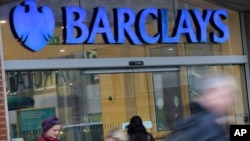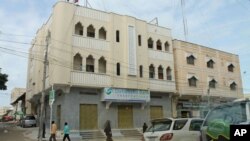NAIROBI —
British bank Barclays says on September 30 it will suspend business with money wire transfer services operating in Somalia. The bank says it fears the transfer services are being used to fund terrorism. But humanitarian aid groups in the country have called on Barclays to postpone its plan to allow time to find a replacement of the service, on which many Somalis rely.
Money transfer is a huge business in Somalia, used by tens of thousands of Somalis to send and receive money from abroad.
But British bank Barclays said it would terminate the accounts of wire transfer companies operating in Somalia on September 30, out of concern that some of the money could be diverted to fund terrorist activities.
Barclays has threatened to terminate the accounts twice before, only to back down in the face of protests.
In an interview with VOA, Abdirashid Duale, the head of Dahabshiil, one of Somalia's biggest money transfer services, said his company is ready to work with international financial institutions to find short- and long-term solutions to the fears and concerns expressed by banks and western governments.
“You know any criteria they want us to meet or the UK [British] government want us to meet, we are happy to do it," said Dualae. "But this kind of decision will affect, it has a humanitarian aspect to it, it will affect the reconstruction of the country and it will affect in my opinion security and stability, because if there is no economical system in the country, how will you get the stability?”
The United Nations estimates Somalia receives $1.5 billion each year through remittances sent from overseas, which are helping the country rebuild from decades of civil war. A third of that amount is sent through Dahabshiil.
Aid organizations are calling for an alternative to a shutdown, as many of the non-governmental organizations working in Somalia, as well as the United Nations, rely on money transfers through companies like the Dahabshiil to pay local staff.
Duale notes the way they operate these days has changed, and says the company is strict with the people they deal with.
“When my father established the company 40 years ago and today is completely different because the world changed since 9/11," said Dualae. "This applies to all entire financial institutions, we ask for your ID, we check your names if it is true or not. In certain countries where there is infrastructure in place, if you give me your passport I can check if it is true (genuine) or not. There are so many infrastructure that we use behind the scene that we do not share with others.”
Financial experts have warned if Somali wire money transfers are suspended, some of these money systems will go underground, and that would not be in the interest of institutions trying to fight money laundering and terrorism financing.
Money transfer is a huge business in Somalia, used by tens of thousands of Somalis to send and receive money from abroad.
But British bank Barclays said it would terminate the accounts of wire transfer companies operating in Somalia on September 30, out of concern that some of the money could be diverted to fund terrorist activities.
Barclays has threatened to terminate the accounts twice before, only to back down in the face of protests.
In an interview with VOA, Abdirashid Duale, the head of Dahabshiil, one of Somalia's biggest money transfer services, said his company is ready to work with international financial institutions to find short- and long-term solutions to the fears and concerns expressed by banks and western governments.
“You know any criteria they want us to meet or the UK [British] government want us to meet, we are happy to do it," said Dualae. "But this kind of decision will affect, it has a humanitarian aspect to it, it will affect the reconstruction of the country and it will affect in my opinion security and stability, because if there is no economical system in the country, how will you get the stability?”
The United Nations estimates Somalia receives $1.5 billion each year through remittances sent from overseas, which are helping the country rebuild from decades of civil war. A third of that amount is sent through Dahabshiil.
Aid organizations are calling for an alternative to a shutdown, as many of the non-governmental organizations working in Somalia, as well as the United Nations, rely on money transfers through companies like the Dahabshiil to pay local staff.
Duale notes the way they operate these days has changed, and says the company is strict with the people they deal with.
“When my father established the company 40 years ago and today is completely different because the world changed since 9/11," said Dualae. "This applies to all entire financial institutions, we ask for your ID, we check your names if it is true or not. In certain countries where there is infrastructure in place, if you give me your passport I can check if it is true (genuine) or not. There are so many infrastructure that we use behind the scene that we do not share with others.”
Financial experts have warned if Somali wire money transfers are suspended, some of these money systems will go underground, and that would not be in the interest of institutions trying to fight money laundering and terrorism financing.












